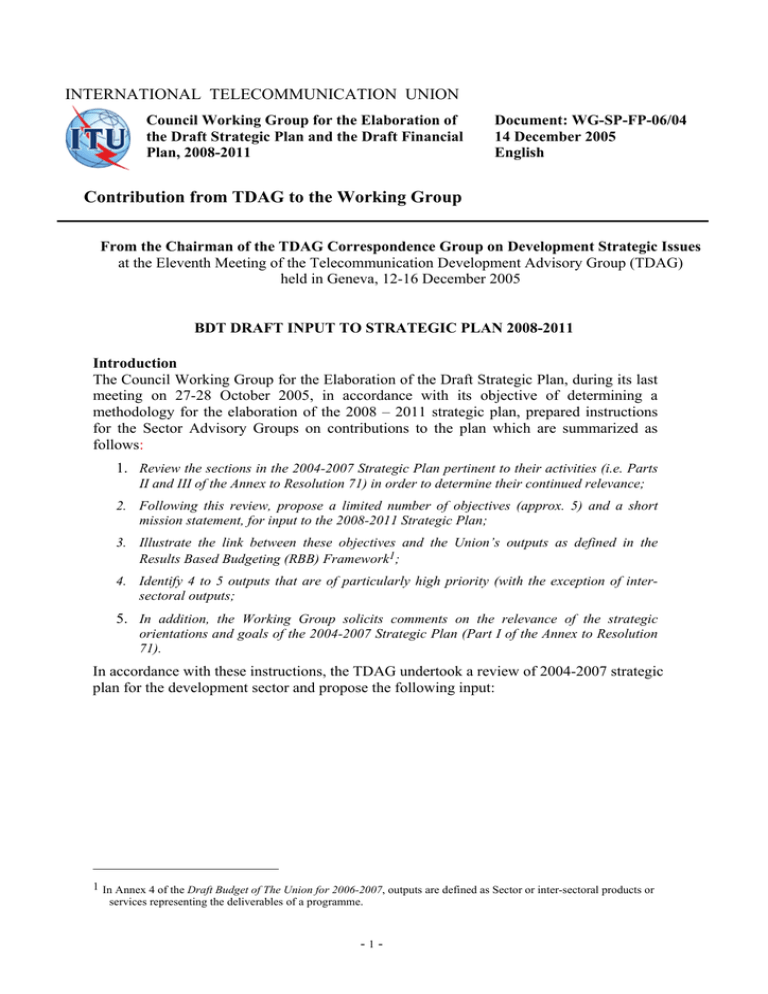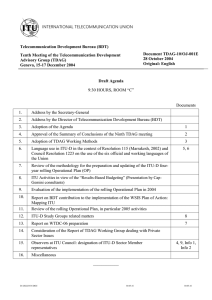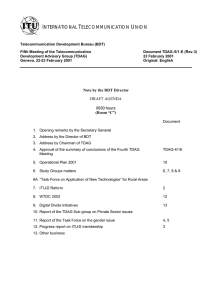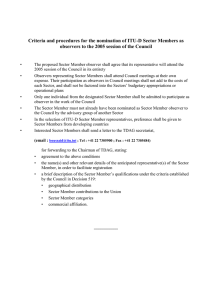INTERNATIONAL TELECOMMUNICATION UNION
advertisement

INTERNATIONAL TELECOMMUNICATION UNION Council Working Group for the Elaboration of the Draft Strategic Plan and the Draft Financial Plan, 2008-2011 Document: WG-SP-FP-06/04 14 December 2005 English Contribution from TDAG to the Working Group From the Chairman of the TDAG Correspondence Group on Development Strategic Issues at the Eleventh Meeting of the Telecommunication Development Advisory Group (TDAG) held in Geneva, 12-16 December 2005 BDT DRAFT INPUT TO STRATEGIC PLAN 2008-2011 Introduction The Council Working Group for the Elaboration of the Draft Strategic Plan, during its last meeting on 27-28 October 2005, in accordance with its objective of determining a methodology for the elaboration of the 2008 – 2011 strategic plan, prepared instructions for the Sector Advisory Groups on contributions to the plan which are summarized as follows: 1. Review the sections in the 2004-2007 Strategic Plan pertinent to their activities (i.e. Parts II and III of the Annex to Resolution 71) in order to determine their continued relevance; 2. Following this review, propose a limited number of objectives (approx. 5) and a short mission statement, for input to the 2008-2011 Strategic Plan; 3. Illustrate the link between these objectives and the Union’s outputs as defined in the Results Based Budgeting (RBB) Framework1; 4. Identify 4 to 5 outputs that are of particularly high priority (with the exception of intersectoral outputs; 5. In addition, the Working Group solicits comments on the relevance of the strategic orientations and goals of the 2004-2007 Strategic Plan (Part I of the Annex to Resolution 71). In accordance with these instructions, the TDAG undertook a review of 2004-2007 strategic plan for the development sector and propose the following input: 1 In Annex 4 of the Draft Budget of The Union for 2006-2007, outputs are defined as Sector or inter-sectoral products or services representing the deliverables of a programme. -1- 1- Mission statement To be the pre-eminent promoter and catalyst for telecommunications/ICT development and the bridge between relevant partners involved in information and communication technologies, with a view to fostering equitable and sustainable access to innovative and affordable services, especially in developing and least developed countries, while, in the same time, in developing synergies between relevant outcomes of the WSIS and programmes and activities of ITU-D. 2- Objectives 2-1 Objective 1 To organize and strengthen the cooperation among ITU-D Members and between ITU-D and other stakeholders, taking into consideration the WSIS results. 2-2 Objective 2 To foster an environment that promotes the development of telecommunications /ICT networks and services, in particular in policy, legal and regulatory domains. 2-3 Objective 3 To support identification of relevant projects to promote investment in telecommunications/ICT related ventures, including through private and public partnerships where applicable. 2-4 Objective 4 To respond to the needs of the ITU-D Membership and others by disseminating relevant information and know how by publishing and distributing materials in coordination and collaboration as appropriate, with the other ITU Bureaux and the General Secretariat. 2-5 Objective 5 To support telecommunications/ICT networks and services deployment and operations with a view to fostering their secure, sustainable and affordable access and use by all segments of society. Particular attention is to be given to the implementation of global and regional initiatives and projects. 2-6 Objective 6 To assist developing countries, particularly LDCs, and countries with economy in transition, in building human, institutional and organizational capacity through training and dissemination of pertinent Human Resource Management Development information for managers and decision makers. 2-7 Objective 7 To undertake economical, financial and technical studies on questions related to the development of telecommunications/ICT, in conformity with the mandate of the ITU-D Study Groups and communicate the results as appropriate. -2- 3- Outputs* and links with the objectives x x x x x x x x x x x x x x x x x x x x x x x x x x x x x Statistics and Telecommunication/ICT Information Special Programme for Least Developed Countries Human Capacity Building Economics & Finance, including costs and tariffs e-Strategies, e-Services/Applications Technologies and Telecommunication Network Development Regulatory Reform TDAG x x Global & Regional Initiatives x Partnership and Promotion Objective 1 Objective 2 Objective 3 Objective 4 Objective 5 Objective 6 Objective 7 Study Groups World & Regional Telecommunication Development Conference Mapping the objectives in the ITU-D outputs x x x x x x x x x (*) The original 19 ITU-D outputs have been consolidated into 12 items in order to facilitate readability 4- High priorities outputs The ranking of the identified high priorities outputs is proposed as follows: 1-International Cooperation (WTDC and Conferences) 2-Programmes and assistance to members 3-Global and regional Initiatives 4-Study groups N. B.The TDAG Correspondence Group on Strategic Group is open to all delegates from the Member States and representative of ITU-D Sector Members. Please refer to ITU-D website: http://www.itu.int/ITU-D/tdag/index.html Email address: tdag_strategic_planning@itu.int ______________ -3-


